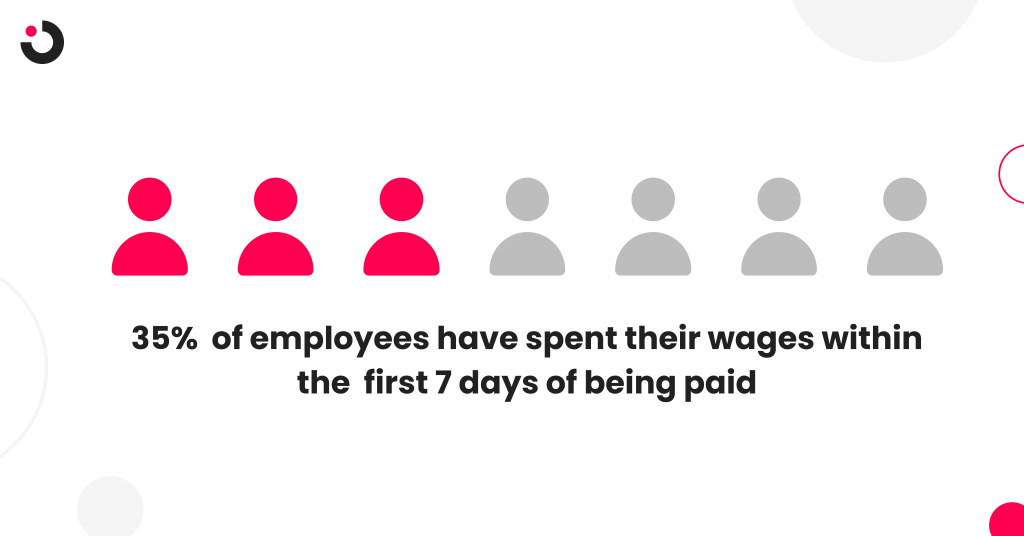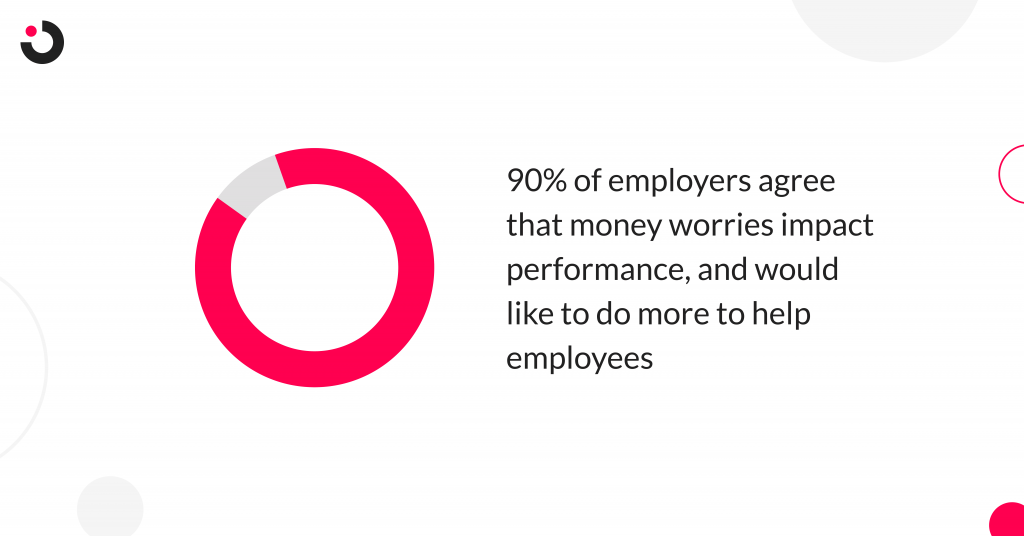
Why monthly pay cycles leave employees stressed out
Getting paid once a month has become widely accepted across the globe. But it makes budgeting so much harder. Join us as we explore how the monthly pay cycle leaves employees vulnerable to high-cost credit. We’ll also look at the benefit of adopting a more flexible pay cycle.
An honest day’s pay for an honest day’s work is how the saying goes. While people may still be seeking this, the phrase itself refers to a different time. A time when workers were actually paid for their day’s work as soon as it was completed.
The end of the working day would see workers physically interacting with their bosses as the money that they had earned was handed over.
This meant that as long as a worker attended work, they had money and food for their family every day. There was little concern with monthly budgeting or saving to cover bills that came at the end of the month.
Of course, the past is often viewed through rose-tinted glasses and no doubt this alternative to monthly pay caused issues of its own. What is clear though is that employees perhaps crave what has gone before.
Monthly pay is of significant benefit to employers, in terms of employee payroll trends and management. But it’s not something that goes hand-in-hand with employee financial wellbeing.
There are over 3 million people in the UK who have turned to payday lenders before payday has come around. This alone highlights that the system of monthly pay just doesn’t work.
At Openwage we believe in an alternative to monthly pay and we would like to show you why.
Feast or famine
When looking at employee payroll trends, the vast majority of workers receive their pay on a monthly basis. As payday approaches, many employees are counting down the days, knowing that they’re in desperate need of funds to reach their account.
During this count-down phase, employee wellbeing reaches all-time lows as many are stressed and anxious as they contemplate how they are going to make it through. This obviously has an impact on productivity levels in the workplace. This is because the stress and anxiety created by money worries and a lack of funds can’t be ignored.
An employee is often unable to switch off from money worries just because they are at work. In fact, they’re often unable to switch off at all until payday arrives again.

As payday approaches, some employees will be running out of money. They could be stalling on important payments or having to go without everyday essentials.
But when payday comes around, suddenly their bank accounts have been replenished and can enjoy life’s luxuries again. Essentially, this is a feast and famine cycle.
- A report from 2016 shows that 35% of employees have spent their wages within the first 7 days of being paid.
- Around 7% have done this within a single day.
- 37% of employees report facing money struggles every month and are unable to make their wages last.
Having struggled for such a large proportion of the month, employees may find it hard to control impulses. They may also develop a mentality that sees them rewarding themselves while they have the chance, knowing that a week down the line they won’t be unable to.
An alternative to monthly pay could bring a welcome end to this cycle.
The cycle of debt
When considering employee wellbeing, you have to consider the impact that debt can have on employee mental health and, in turn, on performance in the workplace.
When employees don’t have enough to get them through until the next payday, where will they turn? Whether it’s to cover day-to-day expenses or the cost of a boiler breakdown, many people are still turning to payday loans.
Payday loan companies have long preyed on those who are vulnerable. While they may have become the focus of attention for the FCA, they are still able to charge interest at an extortionate rate. Aside from the scandalous interest rates, the other major issue with payday loans is that they lead to employees becoming trapped in a vicious cycle.
By the time payday comes around again they receive their same monthly wage. This time, however, they have to repay the loan from the previous month.
Once they’ve settled the loan, the rest of the month becomes even less manageable than the previous one. The answer? Another payday loan, and so the cycle continues.
An alternative to monthly pay, such as that offered by Openwage, removes the need for employees to turn to payday loan companies. It also avoids the slippery slope towards debt.
Life is getting more expensive
Once employees have rinsed their wages, there are still expenses that crop up and essential items they need to buy. Items such as washing machines, cookers, or laptops for the kids’ schoolwork are all essentials that just can’t be put off.
When there are no funds left and payday is still two weeks away, then there are limited options available to make these essential purchases possible. Often, these situations lead people to use credit cards, expensive finance agreements, or even turn to payday loans again.
While these options solve the initial problem of paying for essential items, they present a more serious issue because of the extortionate high rates and fees that borrowers have to pay.
Using credit cards, payday loans, or other forms of finance to pay for items can mean they end up costing around three times as much as they should. This is because of the interest the borrower pays.
This sees employees being punished as they have no access to the money that they’ve already earned. It seems incredible that with so much available on-demand, employees still have to wait until their monthly payday to receive what they’re owed.
Added to this is the fact that there are now additional financial commitments to be met on a monthly basis. Plus, next months’ pay is highly unlikely to last any longer than the previous one.
The fear of a new job
One of the worst effects of monthly pay cycles that is often overlooked is the impact on new employees.
It’s possible that an employee’s start date will fall at the wrong point in a pay cycle, meaning they have to wait an extremely long time until they receive their first pay. They could end up waiting six weeks or more before they receive any pay.
Concern for employee wellbeing specifically when new employees join isn’t normally on employers’ radars. But worrying about when they will be paid can actually leave employees almost fearful about joining your organisation. It could even lead them towards one of your competitors.
Starting a new position in a new company becomes a gamble timing-wise. Either a new employee is fortunate enough to have savings to fall back on, or they are vulnerable to resorting to the cycle of payday loans within days or weeks of joining you.
Without doubt, no company wants that for any of its employees. But in truth this scenario can be the consequence of the traditional pay cycle.
An alternative to monthly pay that enables employees to access their money before payday means that this situation can be completely avoided.
The Openwage solution
With Openwage, your employees can access a portion of their pay as soon as they have earned it, representing an alternative to monthly pay that employees both appreciate and need. Research shows that employees are tired of running out of money before the end of the month and turning to payday loans.
Data collected in February 2020 revealed that one in ten (11% or 5.6 million people) held one or more high‑cost loans, often using them to pay for everyday expenses.
Research has also found that 90% of employers agree financial worries are detrimental to workplace performance and would like to help their employees more. They have the ambition, but they lack direction on how to do it.
By joining forces with Openwage, your company can offer a financial wellness benefit that trumps all the rest. And it won’t affect your payroll or cashflow.

On-demand pay with Openwage isn’t a loan and employees don’t pay any interest. Employees can access a portion of their earned pay to cover an unexpected bill or pay for an emergency repair without needing a payday loan.
Using Open Banking, Openwage links to an employee’s bank account to fund on-demand pay. There’s no cost implication for employers and no impact on their cashflow.
Companies that are firmly focused on looking after their people are increasingly offering employees an alternative to the monthly pay cycle. Show your employees you care by giving them greater control over when they get paid so they can be more in control of their finances.
Get in touch
If you’re looking for an alternative to the traditional monthly pay cycle, Openwage can help. Find out more about the benefits for your employees and your company on our Employers page.
The information in this article is for general information only. It does not constitute professional advice from Openwage. Openwage is not a financial adviser. You should consider seeking independent legal, financial, taxation or other advice to check how the information in this document relates to your unique circumstances.

